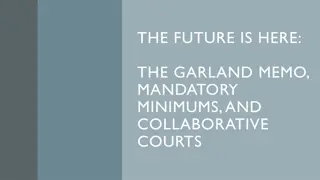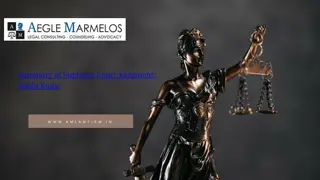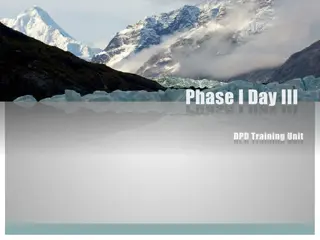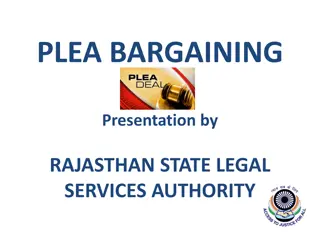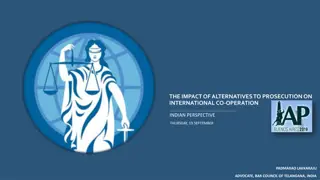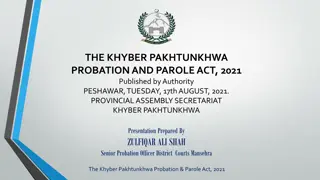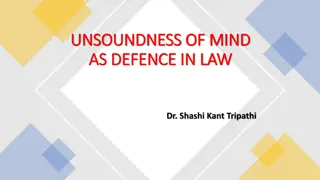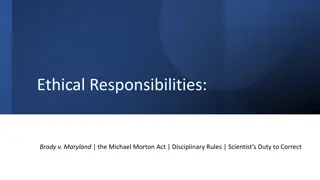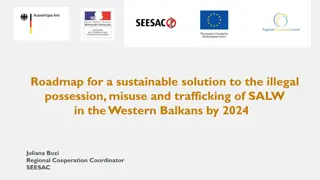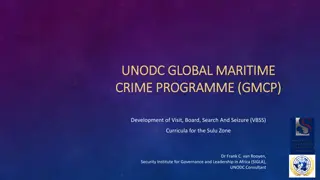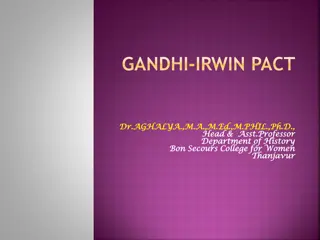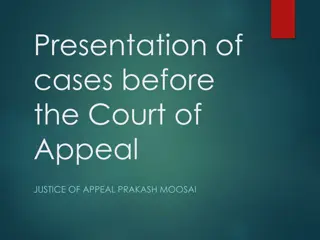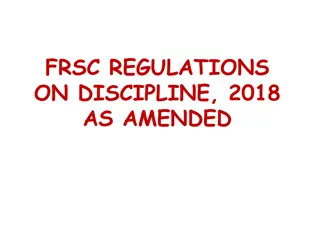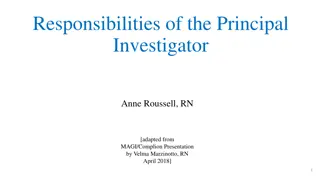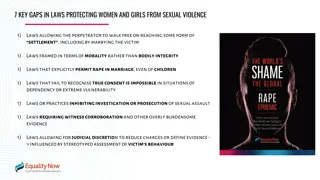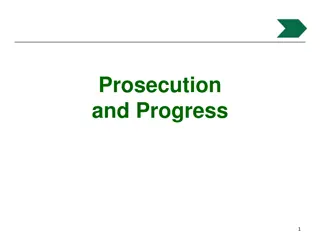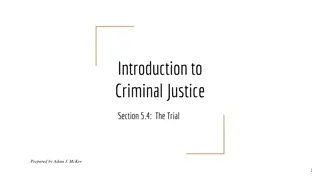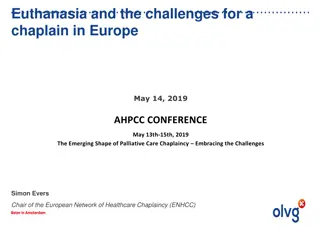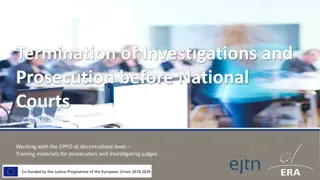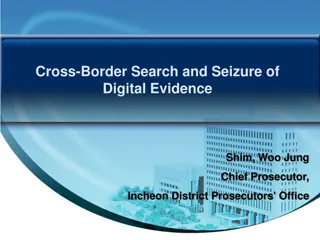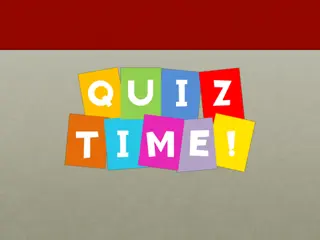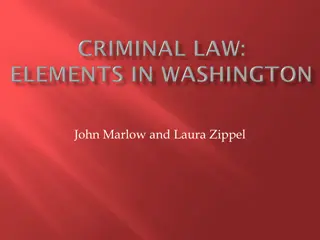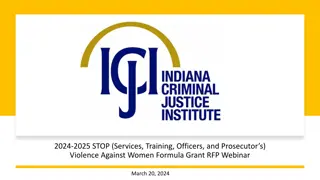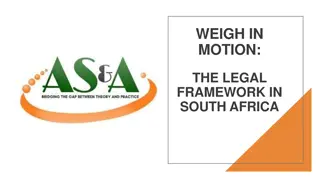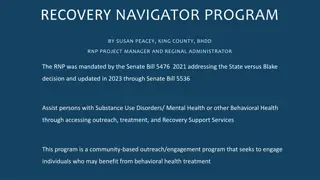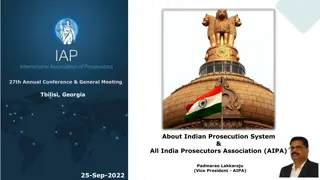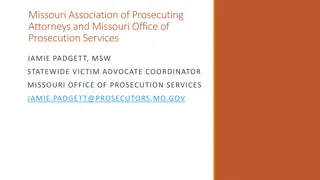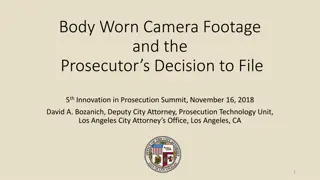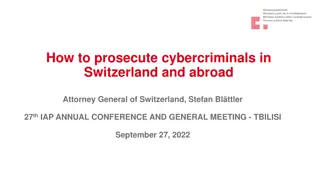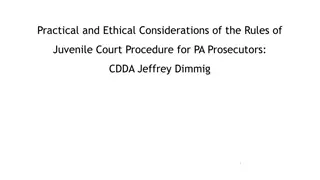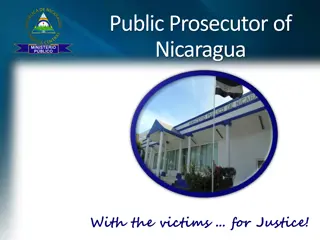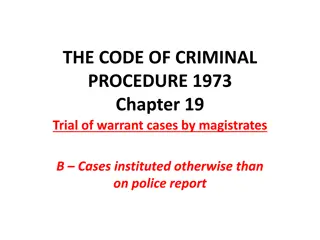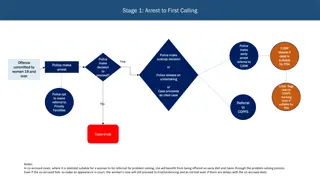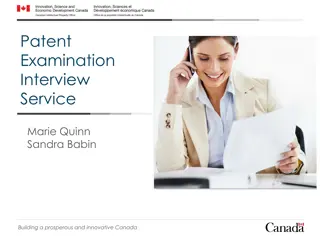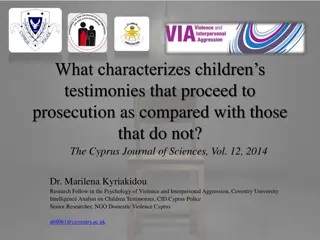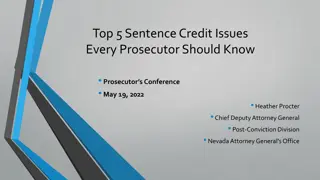Prevention and Combating of Hate Crimes and Hate Speech Bill [B.9B.2018]
The Prevention and Combating of Hate Crimes and Hate Speech Bill aims to address incidents motivated by prejudices through the creation of offenses of hate crimes and hate speech. It seeks to prevent and combat these offenses by defining hate crimes, hate speech, and establishing measures for prosec
1 views • 18 slides
Reform in Criminal Prosecution: The Garland Memo Impact
US Attorney General Merrick Garland's memos on general policies and drug cases highlight considerations for charging, mandatory minimums, and sentencing recommendations to address disproportionality and promote tailored approaches in criminal prosecution. The memos emphasize alternatives and case-sp
3 views • 10 slides
Summary of Supreme Court Judgment Dablu Kujur AMLAWFIRM
Importance of Detailed Police Reports\n\nThe Court emphasised the importance of a detailed and compliant police report, as Section 173(2) outlined. These reports are crucial documents for prosecution, defence, and judicial proceedings. The Court directed that police reports must include specific det
0 views • 4 slides
Overview of Serial Inebriate Program (SIP) and Law Enforcement Procedures
This content provides details on the Serial Inebriate Program (SIP), also known as Chronic Incarcerated Persons, outlining the process involving charges under 647(f) PC. It explains the shift from book and release (B&R) to a keeper with a bail set and a court hearing. It also covers the involvement
0 views • 13 slides
Understanding Context Evidence in Legal Proceedings
Context evidence in legal proceedings refers to evidence of acts not charged in the indictment, used to provide a background for understanding specific allegations. This type of evidence is often relied upon by the prosecution to explain events or behaviors that may seem isolated or surprising. It i
1 views • 13 slides
Understanding Plea Bargaining: Definition, Applicability, and Process
Plea bargaining is a negotiation process between the prosecution and defense, allowing the accused to plead guilty for reduced punishment. It aims to expedite case disposal and lessen court burden. Applicability criteria include offenses with a maximum 7-year sentence, involving women or children un
0 views • 14 slides
Impact of Alternatives to Prosecution on International Co-operation: Indian Perspective
The Indian perspective on the impact of alternatives to prosecution, such as plea bargaining, compounding of offences, probation, arbitration, compensation, open prisons, and immunity from prosecution for volunteering narcotic addicts, reflects a historical evolution in the legal system. The concept
1 views • 13 slides
The Khyber Pakhtunkhwa Probation and Parole Act, 2021 Overview
The Khyber Pakhtunkhwa Probation and Parole Act, 2021, outlines the establishment and functioning of the criminal justice system in the province. It discusses the roles of various agencies like judiciary, prosecution, police, probation, and prisons in controlling crime. The Directorate of Reclamatio
0 views • 29 slides
Enhancing Senior Citizen Safety: Legislative Mandates and Framework
Over the years, senior citizen parliaments have highlighted safety challenges faced by the elderly, especially within the criminal justice system. This presentation delves into the legislative mandates, frameworks, and integrated roles in ensuring the safety and security of older persons. It emphasi
0 views • 26 slides
Understanding Unsoundness of Mind as a Defense in Law
The concept of unsoundness of mind as a defense in law is explored through principles of criminal liability and historical legal perspectives. The defense under Section 84 of the Indian Penal Code provides immunity for acts committed by individuals incapable of understanding the nature of their acti
1 views • 20 slides
Ethical Responsibilities in Legal Cases: Brady v. Maryland
Explore the case of Brady v. Maryland, focusing on the obligations of discovery in Texas criminal cases, including the constitutional aspect, the Michael Morton Act, and disciplinary rules. Delve into the critical issue of evidence suppression by the prosecution and its impact on due process rights.
0 views • 55 slides
Sustainable Solution for SALW Issues in Western Balkans by 2024
Working towards a safer Western Balkans region free from illegal possession, misuse, and trafficking of firearms, ammunition, and explosives by 2024. The roadmap includes goals such as harmonizing arms control legislation, evidence-based policies, reducing illicit flows of weapons, raising awareness
0 views • 11 slides
Development of Visit, Board, Search and Seizure (VBSS) Curricula for the Sulu Zone
The development of VBSS curricula for the Sulu Zone involves creating specialized training programs to enhance maritime security in the region. The aim is to adapt VBSS training to the unique requirements of the Sulu Zone, focusing on aspects such as maritime crime investigation and prosecution. VBS
0 views • 18 slides
Gandhi-Irwin Pact and Its Significance in Indian History
The Gandhi-Irwin Pact, signed in 1931, was a pivotal moment in India's independence movement. It marked a shift in British-Indian relations and led to the withdrawal of civil disobedience movements. The pact included agreements on the Round Table Conference, withdrawal of ordinances, prosecution, an
0 views • 11 slides
Overview of Magisterial Appeals and Processes in the Court of Appeal
Presentation of cases before the Court of Appeal, focusing on Justice of Appeal Prakash Moosai. Magisterial appeals against magistrate decisions are guided by specific grounds under the Summary Courts Act. Proper procedures like giving notice of appeal and obtaining instructions are essential. The C
0 views • 21 slides
Amendments to FRSC Discipline Regulations 2018 as of December 2019
The Federal Road Safety Corps (FRSC) Board approved amendments to the Regulations on Discipline in December 2019. The amendments include defining Suspension from Service as the prohibition from carrying out duties and receiving emoluments pending investigation or prosecution for serious misconduct.
1 views • 23 slides
Principal Investigator Responsibilities in Clinical Trials
The Principal Investigator (PI) plays a crucial role in conducting clinical trials. Responsibilities include overseeing the trial at the site, making critical decisions, ensuring compliance with protocols, obtaining informed consent, maintaining accurate records, and more. Non-compliance can lead to
0 views • 36 slides
Critical Analysis of Key Gaps in Laws Protecting Women and Girls from Sexual Violence
This comprehensive analysis reveals key gaps in laws related to sexual violence against women and girls, including issues such as perpetrators walking free through settlement, laws framed around morality rather than bodily integrity, lack of recognition of true consent, inhibitions in investigation
0 views • 7 slides
Understanding Prosecution and Progress in Construction
Key features of a CPM schedule, resources required, schedule management, and job site activities are detailed in this informative content. It covers aspects like monitoring progress, determining controlling operations, submitting schedule updates, and initiating job site activities as per specificat
0 views • 40 slides
Understanding the Criminal Trial Process
The Sixth Amendment guarantees various rights during criminal trials, such as a speedy and public trial, trial by jury, notice of accusations, the right to confront witnesses, and the assistance of counsel. Defendants can opt for a bench trial where the judge decides innocence or guilt. Juries, typi
0 views • 33 slides
Challenges of Euthanasia for Chaplains in Europe
Addressing the challenges that chaplains face in Europe in dealing with euthanasia, Simon Evers discusses stories and facts about euthanasia in the Netherlands, the legal framework, and the practice. The law allows for the suspension of prosecution under specific conditions, ensuring the patient's s
0 views • 30 slides
Procedures for Concluding EPPO Investigations and Prosecutions
Explore the termination procedures in EPPO investigations before national courts, including bringing cases to judgment, dismissal, simplified prosecution, and referral. Learn about the decision-making processes, prosecution before national courts, and the powers of European Delegated Prosecutors. In
1 views • 19 slides
Cross-Border Search and Seizure of Digital Evidence in Global Criminal Investigations
The globalization of criminal information has brought challenges to the search and seizure of digital evidence across borders. Issues like remote data storage, mutual legal assistance procedures, and technical difficulties in prosecution systems require a new approach. Initiatives such as the CLOUD
0 views • 13 slides
Understanding the Power of Persuasion in Criminal Law
Explore the art of persuasion in criminal law, focusing on making effective arguments, analyzing murder statutes, and applying facts to crime elements. Discover how persuasion plays a vital role in convincing juries of guilt or innocence, and delve into the themes of prosecution versus defense.
0 views • 17 slides
Understanding Criminal Elements and Intentions in State Laws
The prosecution needs to prove all elements of a crime beyond a reasonable doubt, including Mens Rea (mental intent) and Actus Reus (criminal act). Each state has its laws defining specific crime elements, sentences, and degrees of seriousness. Examples include arson, assault with intent, and unlawf
0 views • 17 slides
STOP Violence Against Women Formula Grant Program Overview
The Services, Training, Officers, and Prosecutors (STOP) Violence Against Women Formula Grant Program provides support to communities in developing effective responses to victims of domestic violence, dating violence, sexual assault, and stalking. This grant program assists in addressing various for
0 views • 26 slides
Legal Framework for Weigh-In Motion in South Africa
The legal framework in South Africa regarding weigh-in motion involves various acts and guidelines that impact the weighing of vehicles, such as the Trade Metrology Act, Legal Metrology Act, and National Road Traffic Act. The laws govern the requirements for mass measuring, equipment specifications,
0 views • 22 slides
Recovery Navigator Program Overview
This program, mandated by Senate Bills 5476 and 5536, aims to assist individuals with Substance Use Disorders/Mental Health issues by providing outreach, treatment, and recovery support services. It prioritizes engaging with individuals who may benefit from behavioral health treatment, working close
0 views • 12 slides
Evolution of Indian Prosecution System and Current Structure
Evolution of the Indian prosecution system dates back to multiple eras, with changes in who could conduct prosecution in court. The present system includes Special Public Prosecutors and Cadre Prosecutors, appointed based on legal expertise and tenure. The hierarchy of courts assigns different prose
0 views • 10 slides
Missouri Association of Prosecuting Attorneys and Missouri Office of Prosecution Services Overview
The Missouri Association of Prosecuting Attorneys (MAPA) was established in 1969 with a goal to provide uniformity in the discharge of duties to Missouri's elected Prosecutors. The MAPA Board, comprised of current Elected Prosecutors, offers ongoing training throughout the year including conferences
2 views • 13 slides
Ethics in Prosecution: Balancing Justice and Duty
Delve into the complexities of prosecutorial ethics as explored in the TV series "Billions," discussing the duty of prosecutors to seek justice, ethical responsibilities outlined in the ABA Model Rule 3.8, and principles guiding federal prosecution. The narrative highlights challenges such as handli
0 views • 13 slides
Body-Worn Camera Footage and Prosecution Decisions in Los Angeles City Attorney's Office
Explore the impact of the Los Angeles Police Department's Body-Worn Camera program on prosecution decisions in the Los Angeles City Attorney's Office. Discover how the program has influenced criminal investigations, prosecutions, and the allocation of resources in the city.
0 views • 34 slides
Cybercrime Prosecution Challenges and Strategies in Switzerland
Understanding the jurisdiction and challenges of prosecuting cybercriminals in Switzerland, including issues related to legislation, evidence gathering, perpetrator anonymity, mutual legal assistance, and international cooperation. The role of public and private partnerships in combating cybercrime
0 views • 9 slides
Practical and Ethical Considerations in PA Juvenile Court Procedures
Exploring the Pennsylvania Juvenile Act, Rules of Juvenile Court Procedure, Victims Bill of Rights, and Juvenile Prosecution Standards, focusing on the balanced approach to protection, accountability, competency development, and justice for victims and juveniles in delinquency cases.
0 views • 28 slides
Public Prosecutor of Nicaragua: Upholding Justice for Victims
The Public Prosecutor of Nicaragua, established by Law No. 346, is an independent institution dedicated to the prosecution of crimes and representing the interests of society and crime victims. Subordinate to Nicaragua's Legal Framework, it ensures effective judicial protection under principles of i
0 views • 21 slides
Trial of Warrant Cases by Magistrates under the Code of Criminal Procedure 1973
The Code of Criminal Procedure 1973 Chapter 19 outlines the procedure for trial of warrant cases by magistrates where the prosecution presents evidence to support the case against the accused. Section 244 requires the magistrate to hear the prosecution and take all evidence presented. If the evidenc
0 views • 12 slides
Stages of Criminal Justice Process in Cases Involving Women
The stages involve arrest, referral to relevant authorities, decision-making by police and prosecution, assessment for problem-solving approach, court proceedings, and potential sentencing for women aged 16 and over. The process includes early intervention, referrals, assessments, and possible prose
0 views • 4 slides
Streamlining Patent Examination Process for Enhanced Client Service
Patent Examination Interview Service by Marie Quinn and Sandra Babin focuses on reducing pendency and complexity in patent prosecution through telephone interviews. The initiative aims to enhance client service, expedite patent issuance, and align CIPO processes with other international patent offic
0 views • 43 slides
Understanding Factors Influencing Prosecution of Children's Testimonies
The research explores the characteristics distinguishing children's testimonies that proceed to prosecution from those that do not. Highlighting the significance of children's statements as evidence in legal proceedings, it delves into prosecution rates, question types used during interviews, and th
0 views • 11 slides
Understanding Sentence Credit Issues in Prosecution
Explore the intricate details of sentence credit issues every prosecutor should be acquainted with, such as minimum and maximum sentences, parole eligibility dates, and available credits for Nevada inmates. Delve into exceptions, examples, and the importance of controlling statutory sentences for ef
0 views • 15 slides
![Prevention and Combating of Hate Crimes and Hate Speech Bill [B.9B.2018]](/thumb/60513/prevention-and-combating-of-hate-crimes-and-hate-speech-bill-b-9b-2018.jpg)
